On July 25, 2023, the Twelfth Amendment to the Criminal Law of the China (Draft) (hereinafter referred to as the "Draft") was first submitted to the Fourth Meeting of the Standing Committee of the 14th National People's Congress for deliberation. This amendment closely adheres to the Party Central Committee's policy of anti-corruption and protecting private enterprises in accordance with the law, and has revised and supplemented 7 articles of the Criminal Law.

According to the draft, there are three basic considerations for the revision of the Criminal Law. Firstly, we must resolutely implement the decisions and deployments of the Party Central Committee and transform them into legal systems. We will closely focus on the Party Central Committee's major policy of anti-corruption and protecting private enterprises in accordance with the law, and pay more attention to coordinating and playing a good role in the normative protection, guidance and promotion of criminal law. The second is to adhere to a problem oriented approach, focus on prominent problems in practice, and enhance the pertinence of law revision. Thirdly, we must adhere to a systematic concept and rule of law thinking, and accurately grasp the targets and behaviors of punishment.
1、 New Measures to Punish Internal Corruption in Private Enterprises
Revise the law to further increase the protection of private enterprise property rights and entrepreneur rights, and strengthen equal protection for private enterprises. Articles 165, 166, and 169 of the Criminal Code stipulate the crimes of state-owned companies and related personnel illegally operating similar businesses, illegally profiting for family and friends, and engaging in favoritism, low price stock conversion, and selling state-owned assets. However, due to the development and changes of private enterprises in China in recent years, the draft expands the scope of application of this crime to private enterprises and adds three new crimes of breach of trust.
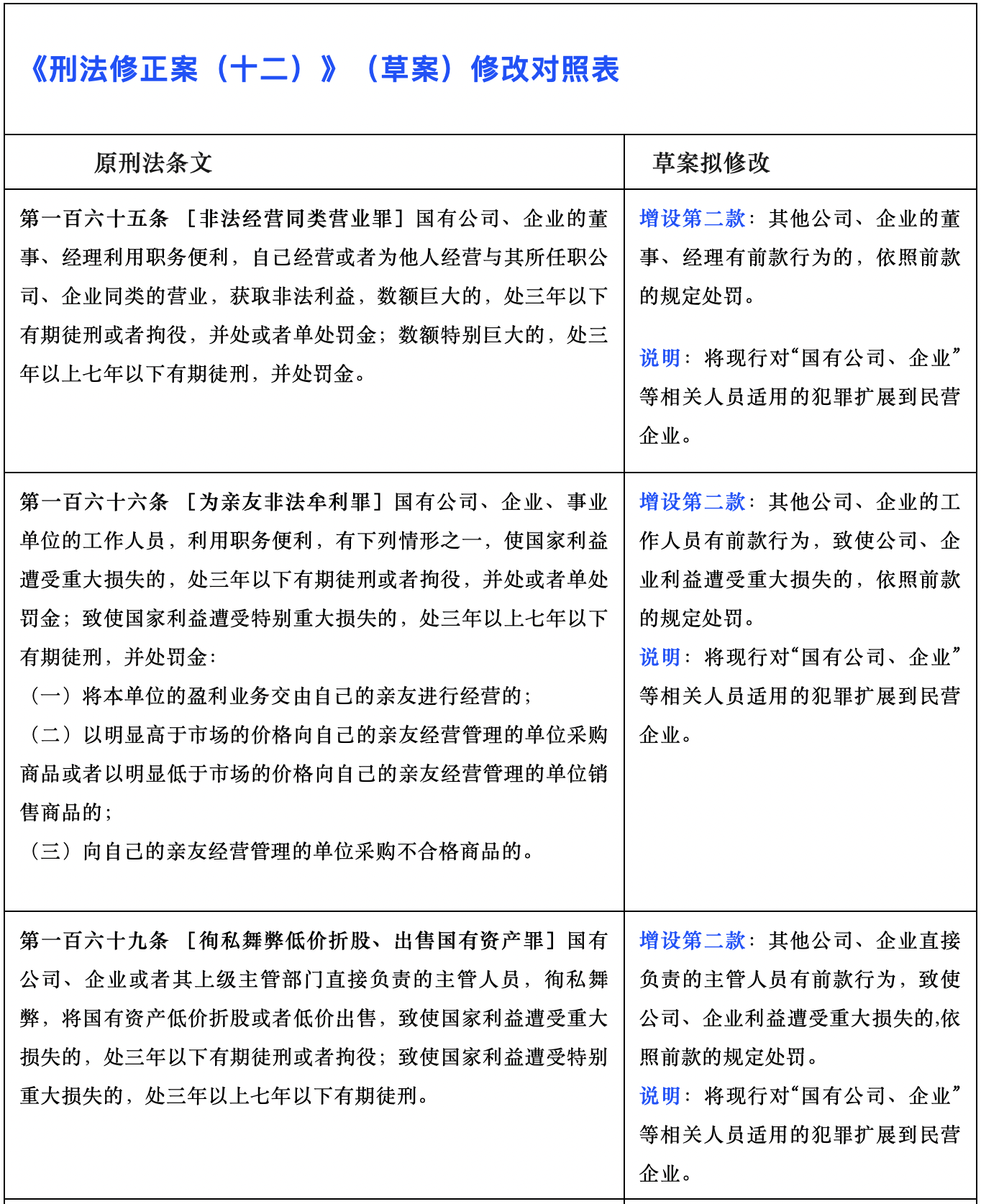
2、 Increased efforts to crack down on bribery crimes
Articles 387, 390, and 391 of the Criminal Code have also been amended. Bribery and bribery are two sides of the same coin. Due to the lenient treatment of bribery personnel in judicial practice, the proportion of bribery and acceptance crimes is excessively imbalanced, making it difficult to cut off the causes of bribery crimes. To further coordinate, while maintaining the intensity of bribery punishment, we will increase the punishment for bribery. Reflected as follows:
1) Add heavier punishment provisions for six types of situations, including repeated bribery, bribery of multiple individuals, and bribery of state officials.
2) Adjust the starting point and level of punishment for bribery crimes, and connect them with bribery crimes.
3) Increase punishment for bribery crimes
4) Balancing the crackdown on unit bribery crimes, adjusting the starting point and level of punishment for unit bribery crimes.
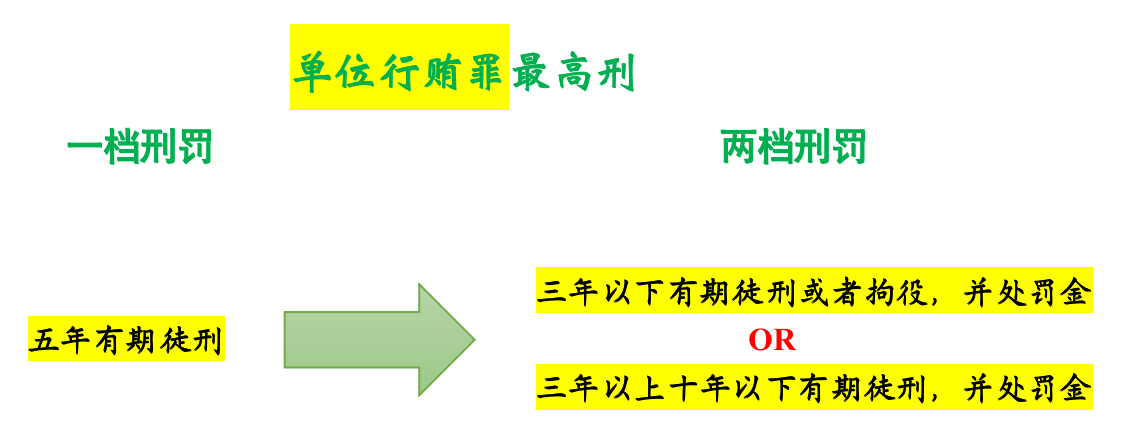

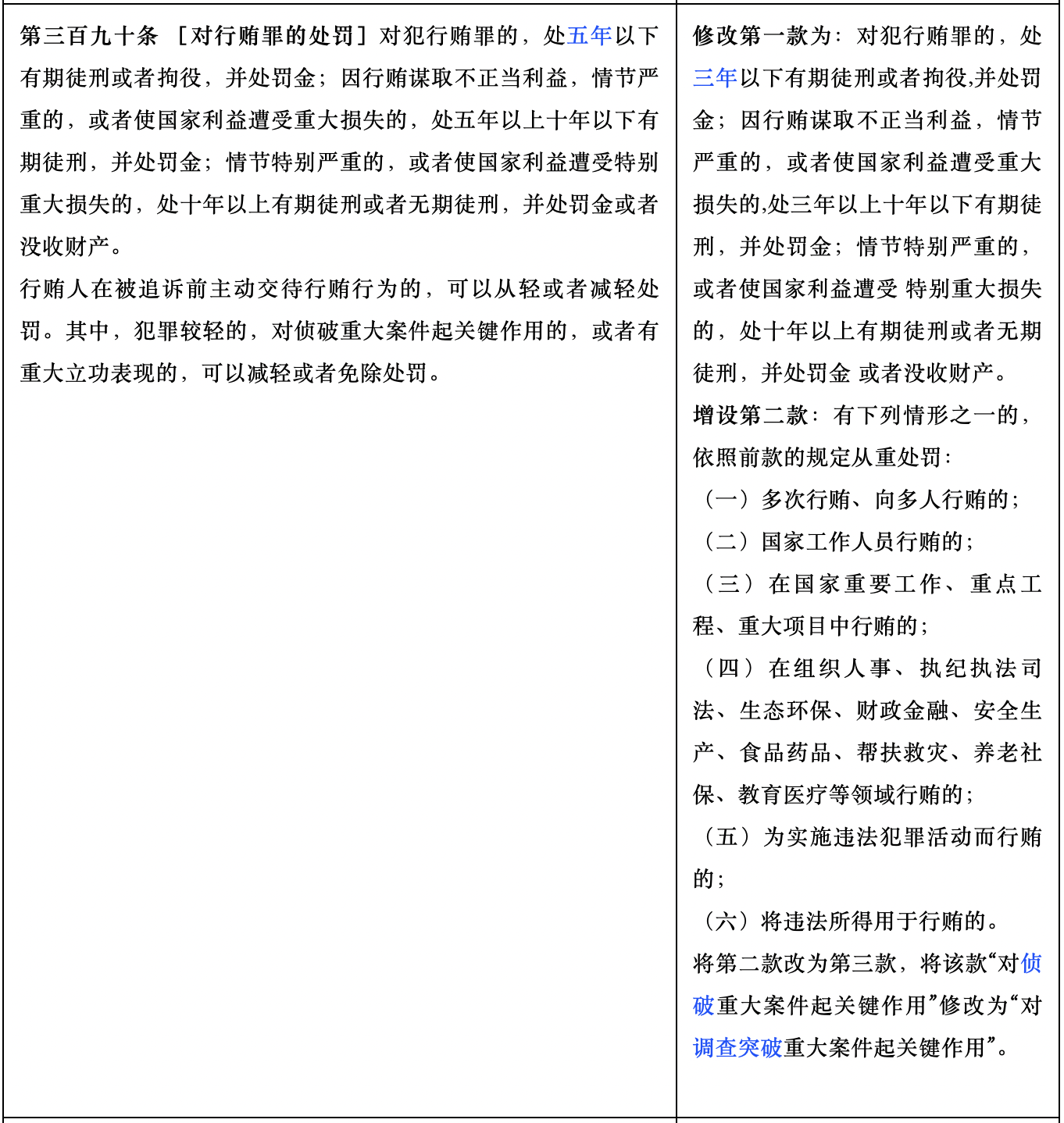
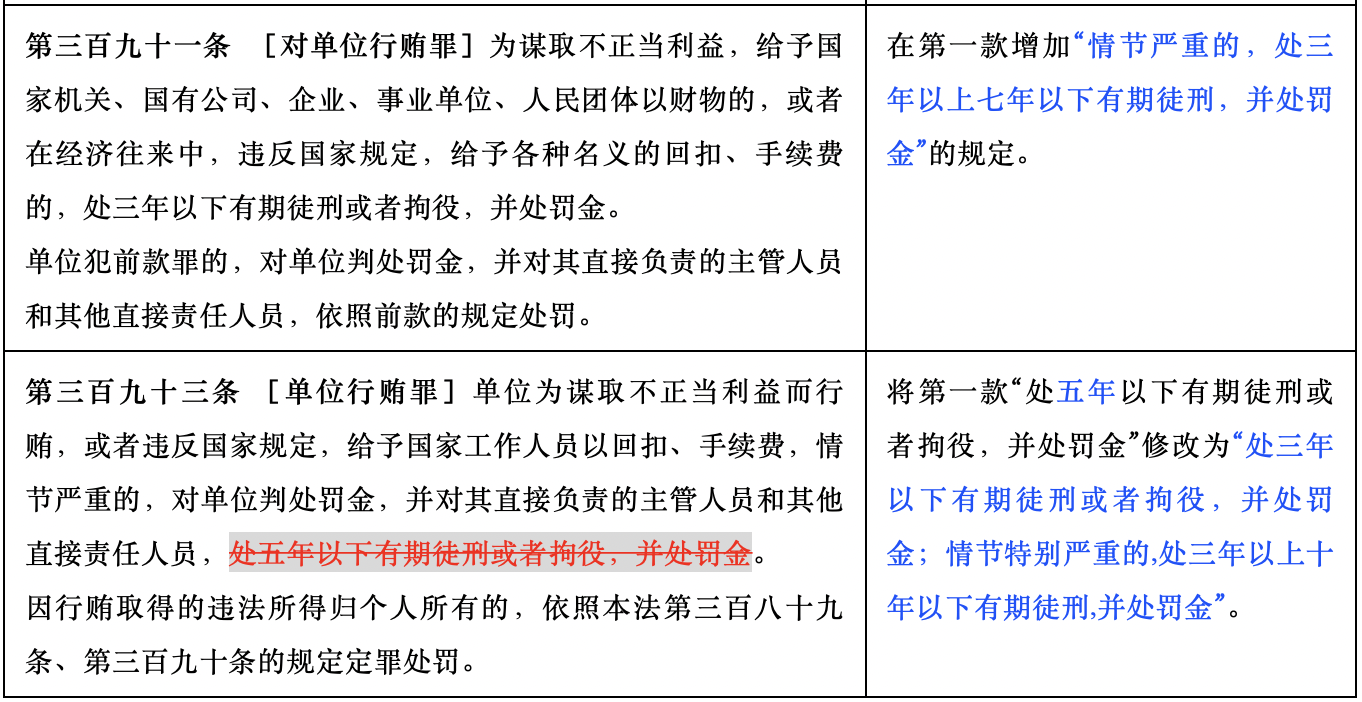
Wang Aili, the head of the Criminal Law Department of the National People's Congress Law Working Committee, also answered questions from reporters regarding the background and understanding of the spirit of this revision.
This revision and improvement of the criminal regulations related to corruption among internal personnel of private enterprises, Wang Aili replied that this is aimed at the behavior of key personnel in internal positions of enterprises who infringe on the interests of enterprises and entrepreneurs due to corruption. Some internal personnel in enterprises have a weak awareness of the rule of law, and even mistakenly believe that "taking state property in state-owned enterprises is a crime, and taking money from bosses in private enterprises is not a big deal". In addition, the internal governance of private enterprises is not standardized, so it is more urgent to strengthen the governance response in this area.
Wang Aili also mentioned the constitution of this kind of crime, that is, to violate the relevant management regulations of the company or enterprise or the obligation of loyalty to the company or enterprise on the premise, to have the corresponding intentional "damage to the enterprise and fatten the private" behavior, resulting in significant losses to the company and enterprise, which is essentially the behavior of the enterprise's internal personnel taking advantage of their positions to engage in illegal Pay-to-play and damage the interests of the enterprise.
Regarding the crime of bribery, it is stated that relevant law enforcement and judicial departments should accurately grasp the legislative spirit, while maintaining a high-pressure situation in punishing bribery crimes, increase the punishment of bribery behavior, properly grasp the policy scale of investigating and punishing bribery, reverse the concept of some law enforcement personnel who prioritize bribery over bribery, and continuously improve their ability and level of handling cases. For bribery cases that are required to be investigated and punished by law, those who should be registered must resolutely file them, The resolute handling of this matter should not be easily withheld or punished, but should be strictly handled. In addition, it also calls on society to firmly establish a awareness and consciousness of complying with the Constitution and laws, and not to undermine the fair competition market environment.
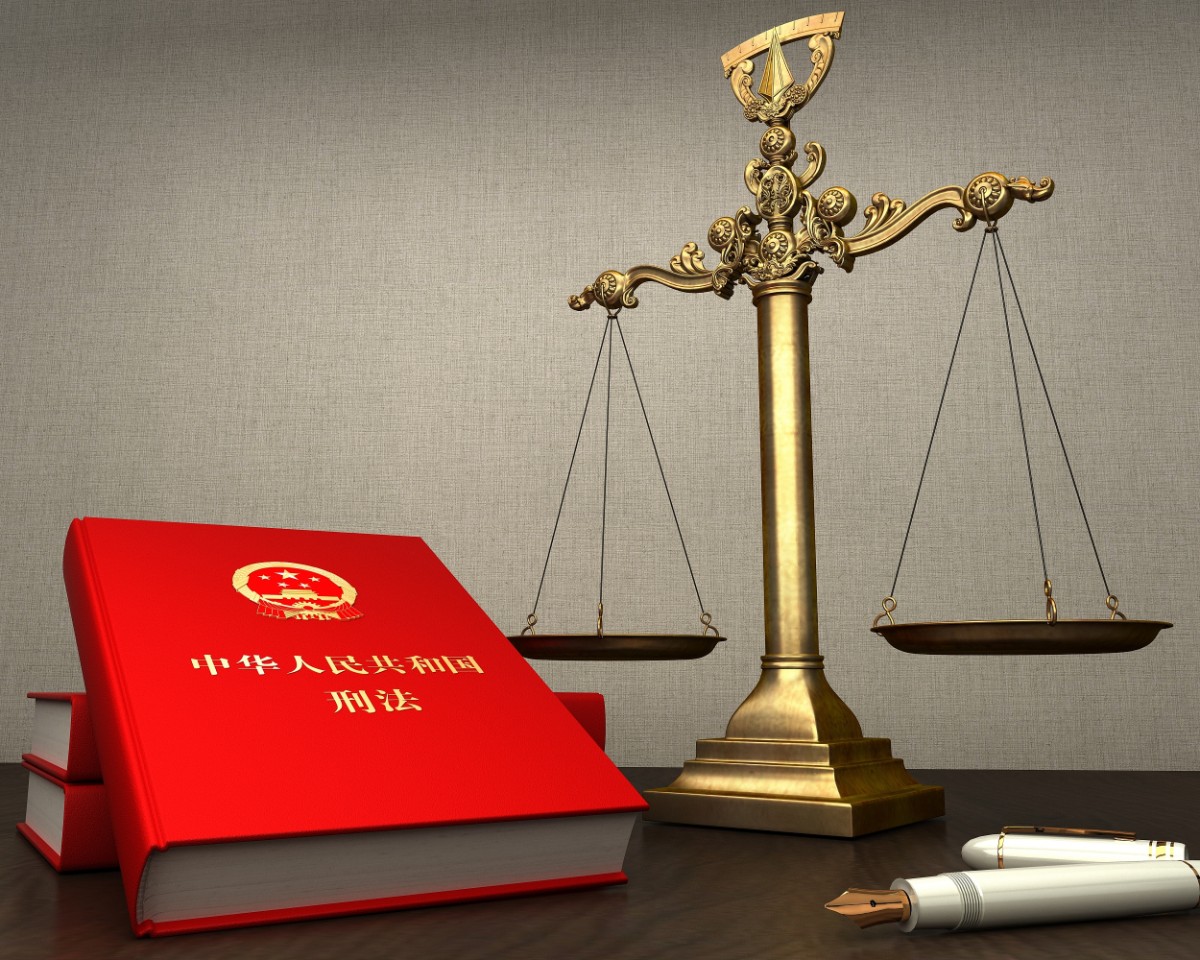
This draft amendment responds to the society's demand for integrity from a criminal perspective, and also implements the private spirit of property rights protection, reducing entrepreneurs' concerns about property rights infringement.
Entrepreneur's English comes from French, which can be understood as the original meaning of "adventurer" in Chinese, referring to one of the meanings as "leader", which is the same as military expeditions; Secondly, it includes colonizers who engage in adventurous activities. The original meaning fully showcases the spirit of entrepreneurs. In the economic recovery period since the epidemic, the rise and fall of private enterprises is crucial, and entrepreneurs are the drivers of their development. This revision undoubtedly leads to a more standardized business environment at the criminal law level. A good system promotes a clean and honest atmosphere in society, which protects the development of private enterprises and greatly benefits future economic development.
However, at the specific implementation level, it is still necessary to clarify the identity of the responsible person in the crime committed by the relevant unit, who is the actual controller of the enterprise? Or is it the director, supervisor, and senior? Further legislative and interpretive work is needed to respond to such detailed issues.